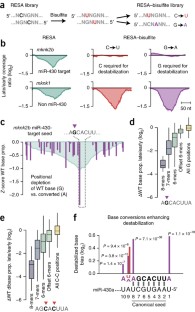

And, once the mRNA – the instructions – are in the cell … human biology takes over. Ribosomes read the code and build the protein, and the cells express the protein in the body.Among highly enriched targets, we identify many genes involved in ASD and show that FMRP affects their protein levels in human cell culture, mouse ovaries and human brain. We deliver the mRNA sequence to the cells responsible for making that protein via one of several modalities. Reaching different types of cells requires different delivery methods. RNA-recognition-element frequency, ratio and distribution determine target mRNA association with FMRP.Before synthesis, we also engineer that mRNA sequence to optimize the mRNA’s physical properties, as well as those of the encoded protein.We design and synthesize the corresponding mRNA sequence – the code that will create that protein.We start with our desired sequence for a protein.We focus on diseases where enabling targeted cells to produce – or turn ‘on’ – one or more given proteins will enable the body to fight or prevent a given disease. We have developed proprietary technologies and methods to create mRNA sequences that cells recognize as if they were produced in the body.

Using mRNA to develop a new category of medicines.Īt Moderna, we are leveraging the fundamental role that mRNA plays in protein synthesis. Messenger ribonucleic acid, or mRNA for short, plays a vital role in human biology, specifically in a process known as protein synthesis. mRNA is a single-stranded molecule that carries genetic code from DNA in a cell’s nucleus to ribosomes, the cell’s protein-making machinery. Without mRNA, your genetic code would never get used by your body. Proteins would never get made. And your body wouldn’t – actually couldn’t – perform its functions. Nearly every function in the human body – both normal and disease-related – is carried out by one or many proteins. Proteins, on the other hand, are the ‘workhorses’ of the body. It’s actually basic human biology.ĭNA (deoxyribonucleic acid) is a double-stranded molecule that stores the genetic instructions your body’s cells need to make proteins. And these instructions direct cells in the body to make proteins to prevent or fight disease. Instead, mRNA medicines are sets of instructions. And they aren’t traditional biologics (recombinant proteins and monoclonal antibodies) – which were the genesis of the biotech industry.

MRNA medicines aren’t small molecules, like traditional pharmaceuticals. What does mRNA do? mRNA produces instructions to make proteins that may treat or prevent disease


 0 kommentar(er)
0 kommentar(er)
